Sponsored Content
OenB Austrian National Bank

Austria's Budget Crisis: Between Austerity Measures and Deficit Procedures
The Austrian government is facing one of the biggest financial challenges in recent years: the budget deficit, originally estimated at 6.4 billion euros, has almost doubled according to current forecasts and could reach up to twelve billion euros. This dramatic development forces the coalition of ÖVP, SPÖ, and NEOS to rethink their austerity plans and possibly face an EU deficit procedure.
March 31, 2025

Citizens' Initiative Calls for an Austrian State Bitcoin Reserve
A new Citizens' initiative is causing a stir in Austria: A group of Bitcoin enthusiasts is calling for establishing a state Bitcoin reserve worth 2.3 billion euros. The initiators see this as a strategic hedge against inflation and an opportunity to achieve financial independence for the country. However, the project is not without controversy.
February 18, 2025

Shock for Austrian Foreign Trade: Weak Demand from Abroad Depresses Exports
The Austrian economy is facing a new challenge: exports slumped more sharply in November 2024 than they have for years. In particular, weak demand from Germany and the EU is causing concern - experts are warning of long-term consequences for industry and the labor market.
February 7, 2025
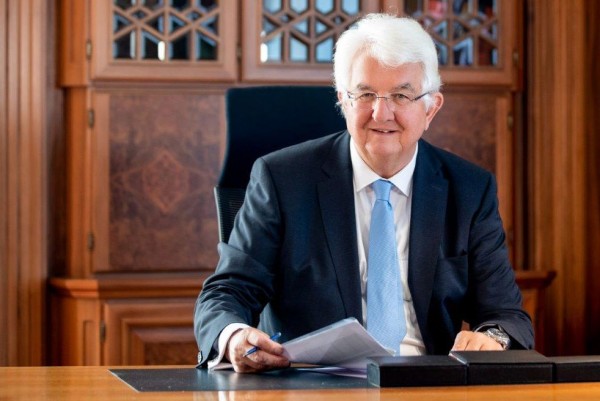
Austria's National Bank Chief: Budget Coffers are Filling Up Again
Robert Holzmann, Governor of the Oesterreichische Nationalbank, sees the high inflation of recent years as a major challenge for Austrian savers. Now that salaries have risen and household budgets are being replenished, he nevertheless urges caution. For a sustainable economic upturn, he says, consumer and investor confidence is essential.
November 10, 2024

Vienna to Become a Center for Financial Technology: AFT 2024 International Conference
Vienna will once again become the international hub for innovative financial technologies in September 2024. From September 23 to 25, 2024, the sixth edition of the Advances in Financial Technologies (AFT) conference will take place at the Austrian National Bank (OeNB).
September 11, 2024

Austrian National Bank Examined the Spread of Crypto Assets in Austria
Cryptocurrencies such as Bitcoin are widely known in Austria, but their actual distribution in private households remains modest. A recent study by the Austrian National Bank (OeNB) found that only 3% of the population own crypto assets. These few owners usually only hold small amounts, which rarely make up more than a third of their total financial assets.
July 16, 2024

Inflation Outlook for Austria Shows Significant Improvement
The Austrian National Bank's (OeNB) latest inflation forecast gives cause for cautious optimism for the Austrian economy. Inflation has decreased and economic growth has also returned since the start of the year, albeit weakly.
March 13, 2024
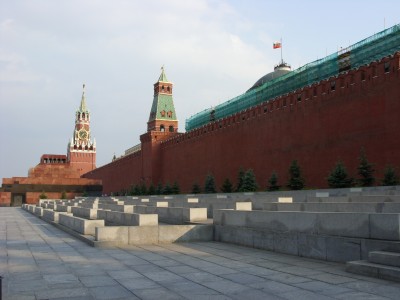
Decline in Frozen Russian Assets in Austria
The significant drop in the volume of frozen Russian assets in Austria, as observed over the past year, mirrors a broader trend seen in other countries, where the handling and status of these assets have been dynamic and subject to legal, political, and financial considerations.
February 21, 2024
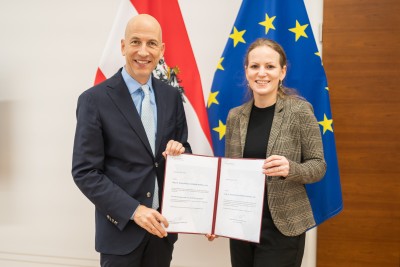
Realignment and Expert Dialog: Austria's Path to Fair Competition
The new head of the Federal Competition Authority (BWB), Natalie Harsdorf-Borsch, has set herself the goal of taking stronger action against companies that abuse their market power. This focus marks a strategic reorientation of the BWB, which previously dealt primarily with price agreements and investigated fewer cases of abuse of market power.
January 28, 2024

Real Estate Prices in Austria Increased: Housing Increasingly Less Affordable
The cost of residential real estate in Austria has risen dramatically in recent years, significantly affecting affordability for many households. According to a recent analysis conducted by UniCredit Bank Austria, residential property prices in the euro area have risen faster than incomes. Austria has been particularly affected by this development, where property prices have actually fallen by almost 40 percent compared with incomes.
August 31, 2023
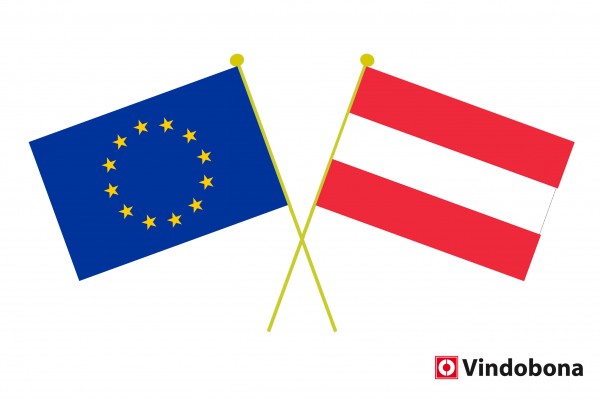
European Movement Austria Presents Reform Ideas for the EU Single Market
Europe has achieved a level of prosperity that no previous generation has experienced. The EU Single Market, which celebrates its 30th anniversary this year, is the key to this success. The future of the Single Market was the focus of a panel discussion of the European Movement Austria (EBÖ) at THE LEO GRAND in Vienna.
June 27, 2023

Austrian National Bank Publishes Macroeconomic Forecast for 2023 to 2025
According to the published forecast of the Oesterreichische Nationalbank (OeNB), the Austrian economy is expected to pick up speed in the second half of 2023, with GDP growing by 0.5 percent in 2023. Accelerated growth of 1.7 percent is forecast for 2024. Although HICP inflation will fall steadily after the highs at the beginning of the year, it will still be above average at 2.9 percent in 2025.
June 18, 2023

Austrian National Bank: Monetary Policy Strategies Must Act
In his speech at the opening of this year's Economics Conference, Austria's National Bank - Governor Robert Holzmann shed light on the importance of a robust and resilient monetary policy in uncertain times. Given the recent financial market turmoil, he stressed that monetary policy strategies must not remain empty words and that the instruments must work.
May 24, 2023

Financial Assets of Austrian Households Decline for the First Time Since the Financial Crisis
The economic crisis, high inflation, falling share prices and rising energy prices are now taking their toll. According to a new study, average household wealth in Austria fell in recent months for the first time since the 2008 financial crisis.
October 31, 2022
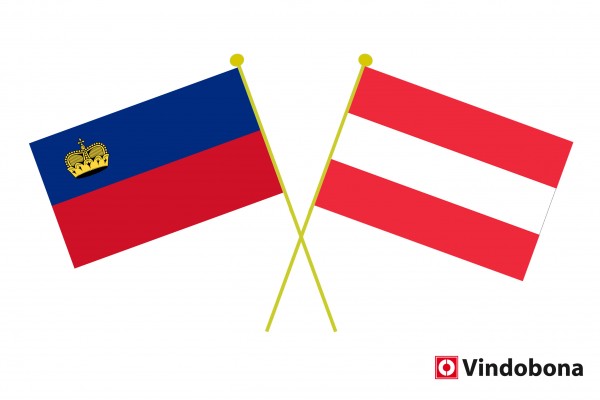
Liechtenstein Foreign Minister Dominique Hasler Visited Austria
Austria's Foreign Minister Alexander Schallenberg received the Foreign Minister from the Principality of Liechtenstein, Dominique Hasler, for a working meeting in Vienna. The exchange focused on bilateral issues, the Russian invasion of Ukraine, the status of EU enlargement in the Western Balkans and cooperation in multilateral affairs. In addition to the bilateral meeting, there was the annual Liechtenstein Reception at the Gartenpalais Liechtenstein.
September 11, 2022

Austrian National Bank Expects Highest Inflation Rate in 50 Years
In a recent analysis, the Austrian National Bank expects inflation in Austria to settle at 7.6% in 2022. This particularly high value represents the highest inflation since the crude oil crisis in the 1970s. Inflation is also expected to remain above the target of 1.9% in the coming years.
July 11, 2022

Vienna Stock Exchange Prize 2022 Back on Stage Again
This year, for the first time, the Vienna Stock Exchange Award went to the Styrian printed circuit board manufacturer AT&S. Second and third place went to the oil and gas group OMV and the building materials manufacturer Wienerberger. The prize was awarded for the 15th time.
June 15, 2022

EU Oil Embargo: Little Impact on Austria's Economy Expected
The planned EU embargo on Russian oil in response to the war of aggression in Ukraine will have far-reaching consequences for Europe. This is also the case for Austria. In a report, the Austrian National Bank examines the impact on the Austrian economy and forecasts comparatively mild effects. Nevertheless, the embargo conceals a number of risks that could also have a serious impact on Austria.
June 8, 2022

Due to the Ukraine War: Austrian National Bank Still Expects Huge Inflation in 2022
Shortages of raw materials and high energy prices, triggered by the Russian war of aggression in Ukraine, have led to an increased inflation rate of 5.6% in Austria. After the highest measured inflation rate in March 2022 since joining the monetary union, there is no easing now; this is not expected until 2023.
April 11, 2022

Economic Outlook for Austria: The Kremlin's Aggression against Ukraine is a Game Changer
After a few tough years in which the Covid-19 virus shaped the Austrian economy, a new enormously important factor is coming into play - the war in Ukraine. The Russian aggression led to more pessimistic economic outlook and will still play an enormous factor in the Austrian market in the future.
April 4, 2022
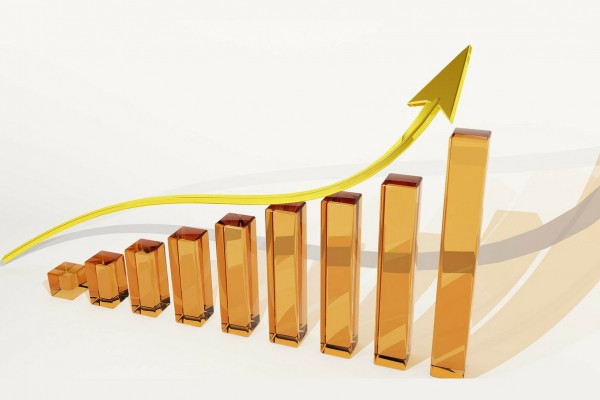
Economic Outlook for Austria until 2024
Strong economic rebound amid high uncertainty about impact of Covid-Omicron variant. Find out what the economic future holds for Austria until 2024.
February 2, 2022

The Consequences of the COVID-19 Pandemic for Austria's Economy
The consequences of COVID-19 pandemic continue to determine economic activity in Austria and the banks’ higher resilience has been key to COVID-19 response.
November 29, 2021

Joint Vienna Institute: Patrick Imam Succeeds Holger Flörkemeier
Patrick Imam joined the JVI - Joint Vienna Institute as Deputy Director. Having joined the International Monetary Fund (a party to the Agreement for the Establishment of the JVI) in 2005, he has held positions in the Middle East and Central Asia as well as the African Department (Zimbabwe and Madagascar), the IMF Institute and the Monetary and Capital Markets division. His predecessor Holger Flörkemeier was the JVI Deputy Director for the last four years. On the occasion of his departure, the JVI interviewed him and asked him to share his experience and views on the JVI.
September 28, 2021
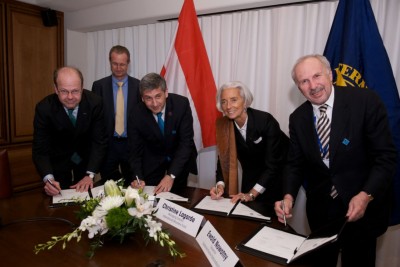
What Is the Joint Vienna Institute and What Does It Do?
The Joint Vienna Institute (JVI) is a Vienna based International Organization which provides policy-oriented training primarily to public sector officials from countries in Central, Eastern and Southeastern Europe, the Caucasus and Central Asia, and other selected countries. It has been a hallmark of cooperation between the IMF and Austria for 29 years. Find out how the institute justifies its existence.
July 22, 2021

Austrian National Bank: Exports Increase Again
Exports, excluding tourism, were above the comparable figures from 2019 for the first time in Austria since the outbreak of the Covid-19 crisis. The Austrian National Bank is confident that a second wave can be contained and that no further monetary or fiscal policy measures are needed.
October 21, 2020

Holzmann is the New Austrian National Bank Governor
The liberal Robert Holzmann (70) took over as Governor of the Austrian National Bank (OeNB) on 1 September 2019, succeeding Ewald Nowotny. The manner in which he will hold his office as governor will be followed with interest. The economist has already stated that he will pay more attention to the monetary policy of the European Central Bank (ECB) than his predecessor.
September 3, 2019
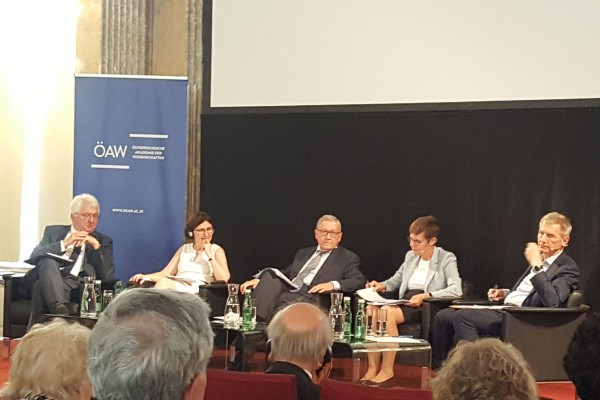
So What Does the Future Hold for the Eurozone?

The Eurozone between crisis and reform. At the Austrian Academy of Sciences, the renowned European financial experts Agnès Bénassy-Quéré, Klaus Regling, Elke König and Josef Zechner discussed the structure, challenges and necessary financial market reforms within the euro zone.
June 28, 2019
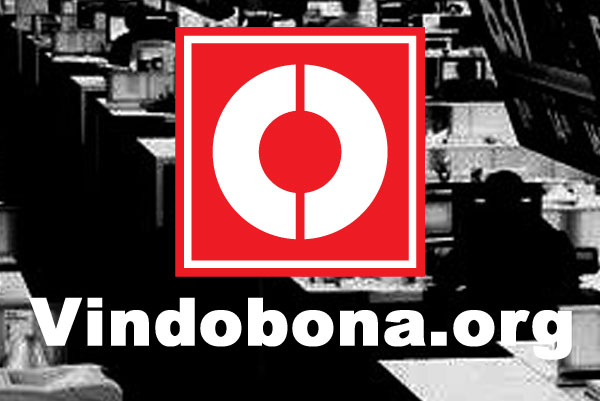
Austrian National Bank Seeking Successors for Top Jobs
The Board of Governors of the OeNB Austrian National Bank has published a recruitment announcement for the new central bank governor, vice governor and two members of the Management Committee. Applications can be submitted until 5 December, according to the official gazette of the "Wiener Zeitung".
November 5, 2018

Repatriation of Austrian Gold Reserves Nearing Completion
This year, and not in 2020, the OeNB Austrian National Bank is already concluding its repatriation campaign for half of its gold reserves. By the end of the year, 140 tonnes of gold are to be stored in Austria, with the other 140 tonnes remaining in London (84 tonnes) and Switzerland (56 tonnes).
March 30, 2018

Austria's Economic Upturn will Continue in the First Half of 2018
The Austrian National Bank expects GDP growth of 0.8 percent for the first two quarters compared to the previous quarter. The economic momentum is unbroken.
February 22, 2018

ECB Unleashes Quantitative Easing - How does it work?
Today, the ECB finally commenced on a large scale sovereign bond-buying programme. The €60bn monthly asset purchases include covered bonds and asset backed securities. Due to the flood of cheap money, the DAX was boosted. The index increased by up to one per cent to a record high of 10,399.67 points. Quantitative easing is a monetary policy where a central bank creates new money electronically to buy financial assets. The aim is to stimulate an economy when standard monetary policy has become ineffective. How does it work?
January 22, 2015

Forecast for CESEE Countries (Webinar)
Central, Eastern and Southeastern Europe (CESEE) have been strongly affected by the economic crisis. However now there are signs of an improving economic climate and growth rates will again be above the EU average. The current situation in the Ukraine and potential difficulties between the EU and Russia constitute a downside risk.
June 24, 2014

Hanna Kordik Awarded the Prize for Outstanding Economic Journalism
Hanna Kordik was awarded the prestigious Horst Knapp Prize in a ceremony. The eulogy was delivered by Ewald Nowotny, Governor of Oesterreichische Nationalbank, in his capacity as chairman of an independent jury. The speaker at the award ceremony was the industrialist Hannes Androsch.
June 10, 2014

Situation for Austrian Banks in Russia is “Sensitive”
According to the latest statistics, Austrian banks are considerably more engaged in Russia than assumed so far. Debts to domestic financial institutes amount to € 50bn.
April 29, 2014

Austrian Banking Sector Making Losses
For the first time in 2013, the Austrian banks made losses in the amount of € 1.035bn.
April 29, 2014

RBI Gets Rid of Public Shareholder
After tough negotiations with the Austrian financial market supervision, the Vienna-listed CESEE lender Raiffeisen Bank International repays about the half of the participation capital.
April 25, 2014

Austrian Banking Sector: Less Banks, More Employees
Since 2000, the number of employees was up by 2,600 in the Austrian banking industry. In the same period, 165 bank shops were closed. Nevertheless, Austria is still over-banked.
April 22, 2014

Austria: Hypo Group’s Investigation Committee Ready for Action
The group of foreign experts at the investigation commission for Hypo Group Alpe Adria is supposed to guarantee the required objectivity. The first results are expected to be published at the end of the year.
April 10, 2014

Austria: Hypo Group Capitalized Again
The Austrian state has filled the capital hole of the ailing bank again.
April 9, 2014

Austria: Purchasing Power Shrinks
Due to higher taxes and social contributions, the real income fell in the last few years.
April 8, 2014

Hypo Group: Heavy Burden for Austrian Fiscal Position
The Austrian National Bank, however, expects the structural medium-term budgetary objectives to be achievable.
April 7, 2014

Austrian RBI Under Pressure
The Austrian National Bank (OeNB) and the Austrian Financial Market Authority (FMA) want Raiffeisen Bank International, the second-biggest lender in CESEE, not to repay the participation capital.
April 2, 2014

Ten Years After The 2004 EU Enlargement: Achievements and Next Steps
International Conference, Vienna, 24-25 April 2014
March 31, 2014

Hypo Group: More than One Billion Required?
As reported by Austrian radio station Ö1, part of the Austrian Broadcasting Corporation ORF, ailing Hypo Group Alpe Adria will require € 1.1bn this year from the state.
March 21, 2014

Hypo Group: Government Explains Downsizing Solution
On Tuesday the Austrian government will explain the decided downsizing solution for the ailing bank Hypo Group Alpe Adria. Carinthia only wants to pay € 300m in downsizing costs.
March 18, 2014

Austria: Spindelegger Demands Valid Figures by Hypo Group
Finance Minister Michael Spindelegger demands valid figures from Hypo Group Alpe Adria before any further capital injections will be made by the Austrian state.
March 15, 2014

Austria: Delay in RBI Paying Back State Capital
Austrian Raiffeisen Bank International (RBI) will take longer than planned to pay back state capital.
March 15, 2014

Austria: Who Will Pay for Hypo Group?
In the dispute around who is to pay for problem bank Hypo Group Alpe Adria Chancellor Werner Faymann intends to negotiate with the Austrian provinces about a contribution to the bank levy.
March 13, 2014

Hypo Group: Insolvency Still an Option?
The group of international advisors appointed by the Austrian government seems to have come to a different conclusion than the task force of Hypo Group Alpe Adria.
March 12, 2014

Task Force: Time Is Running out for Hypo Group
The final report by the task force of problem bank Hypo Group Alpe Adria calls upon the Austrian government to make a decision about the downsizing until mid-March.
March 11, 2014


